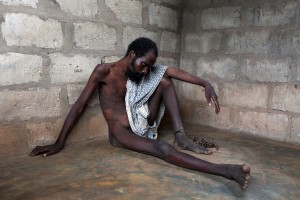
No great genius has ever existed without a strain of madness.
-Aristotle
If I were to tell you that at one time people with mental illnesses were literally chained to trees, given no treatment other than prayers, forced to live in their own feces, and deprived of the known medical treatments of the time, you would probably think that I am talking about some ancient civilization, some backwoods area thirty miles northwest of Athens proper.
Unfortunately, however, people with mental illnesses have been experiencing this horrible treatment in Western Africa for years – and there seems to be no end in sight.
The so-called “treatment” that these people are receiving is nowhere near as forward-thinking or scientifically-supported as the treatments that physicians administered in ancient Greece, over 2,500 years ago – and that is saying something.
“Jesus is the Solution” Prayer Camps have arisen all over Ivory Coast, Burkina Faso, and Benin in the past several years. At these camps, people with mental illness are chained to trees, where they are forced to eat in the same place that they defecate, and are prayed over until the head religious official of the camp deems that a “patient” has “recovered.” Patients at such prayer camps never receive actual diagnoses or medication, however, so an individual’s healing process is solely evaluated by criteria provided by the head religious official.
According to one such official, “If I pray for someone and he finds a cure, he himself will ask to be bathed. But as long as he is not healed, if we tell him that he has to go and wash, he will say no.”
Any patient, whether suffering from depression and anxiety or schizophrenia, will show that he or she is healed when he or she asks for a bath, according to this official. As such, many patients can end up “living” in such camps for years.
Yet you might be wondering, “How are people ending up in these terrible camps?”
More often than not, families bring their relatives to such camps. The stigma of mental illness is horribly pervasive in West Africa, leading many citizens to believe that individuals who suffer from mental illness are possessed by demons. Families often bring their relatives to traditional healers, who fail to provide any form of solution. As a final last-ditch effort, individuals are often brought to prayer camps by their families, who have run out of options. This “service” is free, except for the chain which will bind the suffering individual, which the family must purchase.
How does modern West Africa’s treatment of individuals suffering from mental illness compare to the ancient Grecian understanding of mental illness?
Spoiler alert: Even the most ignorant toga-wearing Grecian doctor would not support the current treatment of mental patients in West Africa.
Although a prevalent stigma towards mental illness was present in ancient Greece, Greek physicians and culture worked hand-in-hand to combat this stigma. For instance, if a person was suffering from depression, he would first go to a “Physician-Hero” (Hear that pre-med kids, you are all heroes!) where he would offer wine and honey to a deity in order that he or she assist him with his distress. If this did not work (for some reason), this man would then travel to a large city such as Athens, where he would meet with a physician (of the non-hero variety). This ancient psychiatrist would ask a variety of questions, evaluating (to the best of his ability) the man’s physical and mental state. They would discuss the man’s wine consumption, exercise habits, and dreams.
If everything else was in order, the physician might diagnose the man with melancholia, a state of sadness caused by an excess of “black bile,” a substance the Greeks believed to be found in certain foods and accumulated through certain lifestyles. In turn, the doctor would prescribe “medications” which would result in a purging of the body (to remove the black bile) as well as a particular diet and exercise regimen.
The physician would then refer the man to a Korybantes, a group of women who would perform ritualistic purification ceremonies. If none of these treatments worked, members of the man’s community, including oracles, priests, and public officials would often come to him in an attempt to make him feel better.
There were even mental illness support groups in which distressed individuals and their families could talk with other such families in an attempt to achieve a better understanding of their respective conditions.
What does this mean for those suffering from mental illness in West Africa? Progress is being stifled and, in turn, people are suffering needlessly – chained to trees and deprived of medication. Prayer certainly has its place in healing, but so does medicine. As intelligent and educated individuals, we must ensure that our faith is not blind.
I will leave you with the words of Gregoire Ahongbonon, the founder of Saint-Camille-De-Lellis, an organization that provides West African mental patients with actual medical treatment,
“As long as there is one man left in chains, it is humanity that is chained. When I see a man tied to wood or in chains, I see my own image. And it is the image of each and every one of us.”
Lee Shaw is a sophomore BIC student majoring in professional writing and the current editor of the QuickBIC.
Further reading on the Ancient Grecian Psychiatry:
Further reading on West African Prayer Camps: